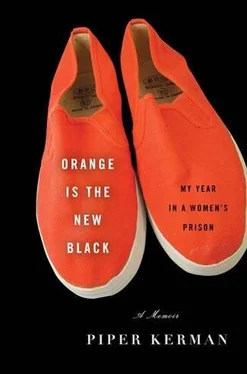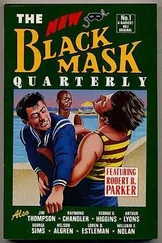It wasn’t just my peers who applauded this trait; the prison system mandates stoicism and tries to crush any genuine emotion, but everyone, jailers and prisoners alike, is still crossing boundaries left and right. My deep contempt for Levy was not only because I didn’t like the way she put herself above others but also because she was the opposite of stoic. Nobody likes a crybaby.
In the following weeks I walked around in a state of tightly leashed fury and despair. I kept to myself, civil within the requirements of prison society but unwilling to chat or joke. Fellow prisoners, offended, sniffed that I must be feeling “some kind of way,” as I was not my usual optimistic self. Then someone in the know would whisper to them that my grandmother was very ill. Suddenly I was the recipient of kind words, sympathetic advice, and prayer cards. And all those things did indeed remind me that I was not alone, that every woman living in that building was in the same rotten boat.
I thought about one woman whose face had been a mask of pain upon the news of her mother’s death-she had rocked silently, her face frozen in a howl as her friend wrapped her arms around her shoulders and rocked with her (in violation of the physical contact rules). I also remembered Roland, an upright Caribbean woman whose staunchness I admired. Roland would tell you straight up that prison saved her life. “I would be dead in a ditch for sure, the way I was living,” she told me. She had done her bid with grace. She worked hard, didn’t mess with other people, had a smile for the occasion, and asked no one for anything. A short while before Roland was to go home, her brother died. She was stoic and quiet and received permission for a half-day furlough to attend his funeral.
But when her family members arrived at Danbury to pick her up, they drove a different car than the one registered in her paperwork. And that was it-she was sent back up to the Camp from R &D, and her family was sent away. A few weeks later she was released. The heartlessness, the pettiness, the foolishness of the situation was the talk of the Camp. Contrarians pointed out that you had to assume that the feds would thwart you brutally given the chance, and that such mistakes were avoidable, but everyone’s hearts ached collectively for her.
Pop sat me down for a talk. “Look, honey, you are eating yourself up. I am gonna tell you, when my father was dying, I was out of my head, so I know how you feel. But listen to me: these bastards-as far as they’re concerned, you got nothing coming to you. You think if you were getting a furlough, you wouldn’t know it by now? Sweetie, you need to call your grandma on the phone, you need to write her, you need to think about her a lot. But you cannot let these fuckers make you bitter. You’re not a bitter person, Piper; it’s not your nature. Don’t let them do it to you. Come here, honey.” Pop hugged me hard, squashing me to her big, scented “jewels.”
I knew she was right. I felt a tiny bit better.
Still, I haunted the administrative offices, which were almost always empty. (God knows what those people were doing.) I wrote letters home and sat in my bunk with my photo album, staring at my grandmother’s smile and her hairdo, the same Babe Paley set she had worn since the 1950s. The Eminemlettes would come by to see me in my cube, then wander away, frustrated that they couldn’t cheer me up. As the air got colder and Veterans Day passed, I checked in with my father every other day by pay phone (she was holding stable, would I be able to get the furlough?), nervous that I would run out of phone minutes. I thought about praying, something I was certainly not practiced at doing. Fortunately several people offered to do it for me, including Sister. That had to count extra, right?
I wasn’t inclined to formal prayer, but I was less skeptical about faith than I had been when I entered prison. On a late September day I had been sitting behind A Dorm at the picnic table with Gisela. She was my coworker in the construction shop, as well as the bus driver, and was one of the sweetest, kindest, gentlest women I’ve ever met, delicate and ladylike, and yet no simp, no Pollyanna. I can’t remember ever hearing Gisela raise her voice, and given that she was the CMS bus driver, this was pretty amazing. Gisela was also graceful and lovely, her face a perfect, pale-brown oval, big brown eyes, long wavy hair. She was from the Dominican Republic but had lived in Massachusetts for years-not in neighborhoods I knew well, but we shared some common ground. Her two kids were waiting for her there, in the care of an elderly woman named Noni Delgado, whom Gisela called her angel.
On this particular day Gisela and I were talking about her upcoming release. Of course she was nervous. She was nervous about finding work. She was nervous about what her husband would do when she got out-he was in the DR, and they had what sounded like a tempestuous and tortured relationship. Gisela said she didn’t want to reunite with him, but he sounded like a person who was difficult to resist, and of course they had children together. I knew that Gisela had no money, and many responsibilities, and that she faced a massive number of unknown but looming challenges. But while she was quick to acknowledge that she was nervous, she also exhibited the peacefulness at her core, the loving calmness that made her the kind of person to whom everyone was drawn. And then she started to talk about God.
Normally, professions of faith or discussions of religion in prison would win eye-rolling and a quick exit from me. I believed that everyone should be able to practice according to their own preferences and beliefs, but an awful lot of pilgrims in prison seem to be making it up as they go along, in silly ways-wearing a contraband napkin on their head one month when they’re practicing Islam, and then appearing in the Buddhist meditation circle the next-after realizing that they could duck out of work for this new brand of religious observance. Couple that with a pretty reliable volume of ignorance about the rest of the world’s faiths (“Well, the Jews did kill Jesus… everyone knows that!”), and I generally didn’t want any part of it.
Gisela wasn’t talking about religion or church or even Jesus, though. She was talking about God. And when she talked about God, she looked so happy. She spoke so freely, and so easily, about how God had helped her through all the struggles in her life, and especially the years she had spent in prison; how she knew that God loved her completely, and watched over her, and gave her the peace of mind, the good sense, the clarity to be a good person, even in a bad place. She said that she trusted God to help her, by sending her angels like Noni Delgado to care for her children, and good friends when she most needed them to help her survive prison. She glowed while she talked calmly and quietly about God and how much His love had given her.
I was startled to feel so moved by what Gisela had to say, and I listened quietly. Some of her beliefs weren’t stated all that differently from the scuttlebutt I had heard from the holy rollers in the Camp, but their protestations of faith were imbued with the need for redemption-Jesus loves me even if I’m a bad person, even if no one else does. Gisela already knew about love. She was talking about an unshakable faith that gave her real strength and that she had carried for a long time. She wasn’t talking about repentance or forgiveness, only love. What Gisela was describing to me was an exquisitely intimate and happy love. I thought it was the most compelling description of faith that I had ever heard. I wasn’t about to grab a Bible; nor was our conversation about me or my choices in any way. It was food for thought.
I had long recognized that faith helped people understand their relationship to their community. In the best cases it helped women in Danbury focus on what they had to give instead of what they wanted. And that was a good thing. So for all my scoffing at “holy rollers,” was it such a bad thing if faith helped someone understand what others needed from them, rather than just thinking about themselves?
Читать дальше












